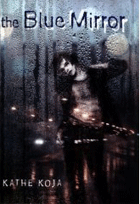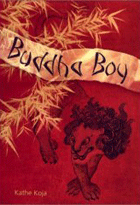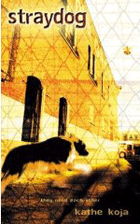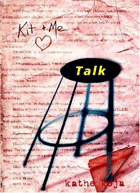 The
Independent Gay Writer is proud to introduce Kathe Koja. This issue, Kathe offers
an article about writing for young adults, "Truth or Consequences."
The
Independent Gay Writer is proud to introduce Kathe Koja. This issue, Kathe offers
an article about writing for young adults, "Truth or Consequences."


 Kathe
Koja is the author of The Blue Mirror,
Buddha Boy, Straydog, and Talk. She lives in the Detroit area
with her husband and son. For more information about Kathe and her
writing, please visit her website.
Kathe
Koja is the author of The Blue Mirror,
Buddha Boy, Straydog, and Talk. She lives in the Detroit area
with her husband and son. For more information about Kathe and her
writing, please visit her website.IGW did a review of her recent
book Talk in the May
2005 issue.
TRUTH OR CONSEQUENCES
by Kathe KojaFiction is really all about telling the truth. When I write a novel, I'm offering readers the truth of what I know, what I've seen, what I honestly believe about life and the world. And since in my work I speak first to young people (my books are aimed at a middle school/high school audience, though I hope readers of any age can find them enjoyable), telling the truth becomes even more essential. Young minds are elastic, engaged in ongoing growth and change; young hearts are expanding, too, beyond the limits of self, to include family, friends, first loves, and eventually the wider world. Growing up is the process of learning to be human: capable of empathy and understanding, able to give as well as take from life.
But all the while they're growing, young people have to grapple with the day-to-day realities, and for kids this means life at school. And for all the kids who are "different" -- maybe LGBT, maybe academically gifted, maybe "artistic," the kids who for whatever reason exist outside the narrow social mainstream -- school can be a minefield. The culture of bullying is still disgustingly alive and well, whether it's expressed as out-and-out physical assault or the more covert cruelty of exclusion and mockery. Either way, the victim carries scars.
So how can a story -- even an honest story -- help?
In my novel Talk I explore what it's like to be young and gay, confused and exhilarated, scared but determined to be who you are. The book follows the characters through their senior year production of a controversial play, also called "Talk," that addresses the issues of free speech and institutional persecution, and the ultimate cost of hiding the self. Throughout the story, I use the text of the play as my characters use the theater: as a place to try on ideas, to illustrate the real truth of their lives.
Sometimes
you get to a point in rehearsal where people stop acting and
start being, and now Kit is like that most of the time. It's
amazing. Like [the director] said before, it's surface tension, a
whole world in a bubble. Our world. When we get up there
[onstage] we're just -- in another place. Together.
-- from Talk
In another of my novels, Buddha Boy, the title character is harassed and bullied because of who he is, a kid who follows his own star, as an artist, as a Buddhist, a kid who practices what he believes even when things get rocky -- and dangerous. Buddha Boy also looks at the responsibility of the onlooker in situations of abuse: when is it right to step in? Always? Ever? Never?
It
was sickening, and stupid, so stupid the things they did. Not
just throwing pennies or jamming his locker or squirting him with
ketchup -- though they did all that too -- but even uglier stuff,
body-checking him in the hallways, trying to trip him going down the
stairs….But it was never McManus actually doing it, of course,
it was [his posse], and even the lesser satellites, the wannabes who
were happy to shine with McManus if all they had to do was be mean to
the school outcast who was a freak anyway, so it wasn't as bad as
picking on a real person, it was like he somehow deserved it, right?
-- from Buddha Boy
In both of these books, the main characters, Kit in Talk and Jinsen in Buddha Boy, are attacked when they step into the truth and fully become on the outside who they are inside. And in both books -- as in life -- the active attackers are a small group, really. What makes it easy for them, makes it possible to hunt and torment Jinsen and Kit, is the complicit silence of the people around them -- not just the other students, but the teachers and school authorities, the ones in charge not only of policing behavior but of fostering attitudes appropriate to human beings, like tolerance. Which in many schools is still in sadly short supply. (One recent example of this can be found in the June 21st issue of The Advocate: Kerry Pacer's brave struggle to create a GSA at her Georgia high school.)
But how can this kind of intolerance be allowed to exist, especially in a public school setting, where kids of all kinds are thrown together, and tolerance would seem to be in everyone's best interest? Tolerance is just about the lowest rung on the ladder of social interactions; tolerance means I don't have to love you, or like you, I just have to accept that you exist and can safely take up space in the world as I take up space. Tolerance is simply admitting the reality of human life: we are all here, all of us, now, today.
In my own experience of visiting high schools and middle schools, the climate of tolerance varies widely from district to district, and even from school to school. Earlier this year, for example, my books were embraced by students at an alternative high school, while in the same school district four of the five middle schools who'd invited me to speak abruptly withdrew their welcome, citing concerns over "appropriate language" in Buddha Boy. (The F-word occurs once in the book.) What disturbed me was not the rescinded invitation, but the attitude of some of the teachers and administrators I met. Not the few who tried to steamroll over the controversy -- a bully is a bully, whether s/he's in a locker room or a conference room. No, the ones who worried me were the larger group who spoke neither for nor against the book, who stayed steadfastly silent in a kind of preemptive self-censorship that wanted only to keep under the radar and out of any trouble, real or imagined. With anyone. Over anything.
It's
all about fear, don't you know that? Fear's the real barbed wire,
fear's what holds us in, fences us from our desires, from what we know
belongs to us.
Their fear. Not ours.
Their fear. Not ours.
-- from Talk
If Kit had given in to his fears of exposure and stayed safely out of the spotlight, he would never have found himself as a gay person, as a gifted actor, as the strong and decent kid he really is. If Jinsen had never become the Buddha Boy, shaved head, begging bowl and all, he would never have overcome his own dark impulses, never have come into the light of his own artistic talent. Even though they are threatened and hunted on the outside, the greatest threat to their well-being, the fullness of their lives, came from within.
Because that's the ultimate consequence of failing to tell the truth: to our kids, to our culture, to ourselves: to live a starveling life, fenced in by the shadow of the lie. And that lie is the symptom of the sickness called fear, the sickness that creates an escalating climate of unreality that dictates what we say, and do, and believe. When we pretend that everything is perfectly OK when it patently isn't. When we let fear tell us it's all right to exclude both people and ideas that we find threatening -- by force, if necessary. When we keep our heads so far down that we see nothing at all.
The only response I have to that fear is to keep on writing. To keep telling all the truth I know about our remarkable, terrible, one-of-a-kind world, where the experience of diversity -- in sexuality, philosophy, the ability to make perfect espresso or sink a monster jump shot -- is what makes that world worth living in, every day. To keep in mind that personality is belief in action, that what we do is what we are, and that the best cure for fear is to keep our eyes -- and hearts -- wide open. To speak to and for those trapped by that barbed wire, no matter what side they're on. Because that wire is our real enemy, not each other.
And that's the truth.
Copyright © 2005 by Kathe Koja